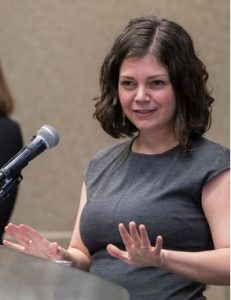Hartford, Connecticut, April 25, 2018—The Marshall Islands may be a remote destination in the Pacific, thousands of miles away from Trinity College, but Emily Mitchell-Eaton, Patricia C. and Charles H. McGill III ’63 Visiting Assistant Professor of International Studies, reframed the story of Marshallese immigration to the United States and brought the experience much closer through her March 28 lecture, “We Are Here Because You Were There: Imperial Migration from the Marshall Islands to Arkansas.”

Emily Mitchell-Eaton, Patricia C. and Charles H. McGill III ’63 Visiting Assistant Professor of International Studies, delivers her lecture. Photo by John Marinelli.
The Marshall Islands, a series of atolls and islands in Micronesia, was occupied by the United States after World War II and used for extensive nuclear weapons testing during the Cold War. This testing, combined with the U.S. military presence there, displaced many Marshallese and drastically impacted the health of multiple generations exposed to radiation.
Marshall Islander migration to the United States soared in the mid-1980s in response to an international agreement between the United States and the Republic of the Marshall Islands, a former U.S. territory. While the agreement marked the formal end of the colonization over the islands, the U.S. military remained. The 1986 Compact of Free Association (COFA) allowed Marshallese to come to the United States—without a visa—to live, work, and receive education. This created a Marshallese migration whose largest resettlement site is now Springdale, Arkansas.
Once a nearly all-white town and remote unto itself, Springdale became a “destination of empire” not only for Marshallese but also for Latinx immigrants, changing the demographic landscape of this small Southern town.
Mitchell-Eaton’s exploration of the Marshallese community came from 55 interviews between 2011 and 2014 and archival research, talking to Marshallese residents, Springdale’s law enforcement and policy officials, social service providers, and immigrant rights activists.
For the groups that interact with the Marshallese, their relationships to them are “compared and framed by their understandings of other migrants” and informed by how they understand, or misunderstand, COFA status. As one attorney Mitchell-Eaton interviewed described, “They’re technically here ‘legally’—whatever that means.”
Mitchell-Eaton explored the effects that living in this “precarious and exceptional” space can have on the resources Marshallese can access, particularly housing, employment, education, and health care. She affirmed that there is “lack of awareness of the U.S. global role as an empire and lack of understanding of COFA status” that “… has dramatic and sometimes violent effects for COFA holders.” Their position in Arkansas, in what itself is considered a remote area of the United States, continues to alter the idea of what it means to be transnational—and relates to the similar precarious legal statuses of other imperial relationships, such as those with Puerto Rico, Guam, and parts of the Caribbean.
In describing the visiting professor’s work, Associate Professor of History and International Studies Zayde Antrim noted that Mitchell-Eaton “challenges us to think of ‘here’ and ‘there’ ” and to rethink “ ‘out there’ as ‘here.’ ” Bringing us closer to “here,” Mitchell-Eaton closed her talk by relating the story of the Marshall Islands with an issue that is geographically much closer to Trinity—the circumstances of Puerto Ricans displaced to Hartford because of Hurricane Maria.
Zsofia Veer, a Hungarian exchange student doing post baccalaureate work at Trinity, takes a global feminism class with Mitchell-Eaton. She noted, “[Professor Mitchell-Eaton] takes this approach with our class, and it was really interesting. Before this, I had no idea about this region or that they had a specific classification. We talk about this with Puerto Rico, too.”
Mitchell-Eaton argues that we “must resolve and pay attention to the state of these groups” and in doing so address the imperial legacy of the United States. As climate change looms, the possibility remains that one day the Marshall Islands will no longer be inhabitable. With this, Mitchell-Eaton asked with a note of irony, “Will Springdale, Arkansas, become the new capital of the Marshall Islands?” Her question highlights the reality that the Marshallese are at risk in multiple ways—not only precarious in their presence in the United States but also in their position as citizens of their own country.
Mitchell-Eaton’s lecture was followed by the annual reception and dinner, which was attended by members of Trinity’s faculty, staff, and students as well as guests from outside of the college community.
The McGill International Studies Fund was established in 1996 with a gift from Patricia C. and Charles H. McGill III ’63. The gift helped secure a matching grant from the National Endowment for the Humanities. The income from the fund is to be used to support the appointment of visiting humanities scholars, primarily international scholars, in the academic areas of international studies that include African studies, Asian studies, Caribbean and Latin American studies, Middle East studies, global studies, and Russian and Eurasian studies.
Charles H. McGill III ’63 is a nationally recognized expert in mergers and acquisitions, as well as corporate strategic planning and restructuring, with significant experience in consumer products, restaurant and food service, and information services. McGill is the founding partner of Sagamore Partners, an acquisitions adviser. Previously, he was a senior executive of Fortune Brands, Dun & Bradstreet, and the Pillsbury Company. McGill is a former member of the Trinity College Board of Trustees and its Board of Fellows. He received the college’s Alumni Medal for Excellence in 1993. The McGills are the parents of a 1994 Trinity graduate.
Written by Tess Dudek-Rolon





Leave a Reply